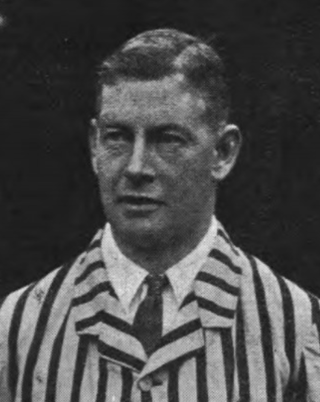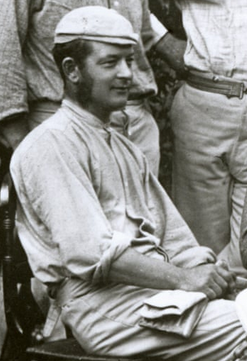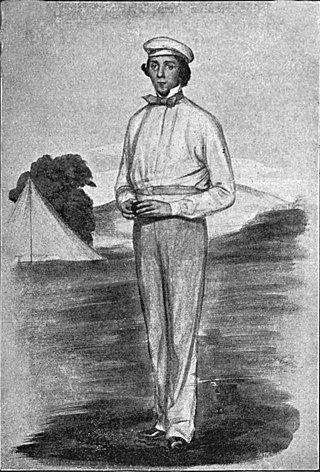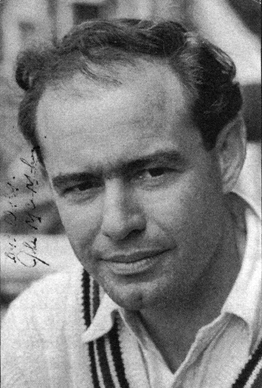The 2005 English cricket season was the 106th in which the County Championship had been an official competition. Before it began, a resurgent England cricket team had won four Test series in a row, going unbeaten through the 2004 calendar year. The start of the international season saw England defeat Bangladesh 2–0 in their two-match series, winning both Tests by an innings. This was followed by a tri-nations one-day tournament that also featured Australia. Australia still started the Test series as favourites but most fans expected England to put up a challenge.

Thomas Walter Hayward was an English first-class cricketer who played for Surrey and England between the 1890s and the outbreak of World War I. He was primarily an opening batsman, noted especially for the quality of his off-drive. Neville Cardus wrote that he "was amongst the most precisely technical and most prolific batsmen of any time in the annals of cricket." He was only the second batsman to reach the landmark of 100 first-class centuries, following WG Grace. In the 1906 English season he scored 3,518 runs, a record aggregate since surpassed only by Denis Compton and Bill Edrich in 1947.
Alan Mullally is an English former first-class cricketer, who played Tests and ODIs. Mullally grew up in Western Australia, and played for the Australian Under-19 side against their West Indian counterparts in 1987/88.

Douglas Ward Carr was an English amateur cricketer who played once for the England cricket team in 1909. Carr only began playing first-class cricket in 1909 aged 37 for Kent County Cricket Club. A leg-break bowler who was one of the early proponents of the new googly delivery, he shot to fame in 1909 and enjoyed a short career in the years before the First World War. He was named one of Wisden's five Cricketers of the Year in 1910.
1865 was the 79th season of cricket in England since the foundation of Marylebone Cricket Club (MCC). W. G. Grace made his debut as a first-class player and the new Lancashire County Cricket Club played its first match.

Edward William Pooley was an English cricketer who played first-class cricket for Surrey and Middlesex between 1861 and 1883. In 1877, he was supposed to be England's wicket-keeper in what would be the first Test match played; however, Pooley had been arrested in New Zealand and was unable to make the journey to Australia with his teammates.

Edgar "Ned" Willsher was an English cricketer known for being a catalyst in the shift from roundarm to overarm bowling. A left-handed bowler, and useful lower-order batsman, Willsher played first-class cricket for Kent County Cricket Club between 1850 and 1875. He took over 1,300 first-class wickets, despite only having one lung. He led a tour of Canada and the United States in 1868, and after retiring from his playing career became an umpire.

George Freeman was an English first-class cricketer. He made 32 appearances for Yorkshire County Cricket Club from 1865 to 1880. He also played four matches of first-class cricket for the "United England Eleven" (1866–1869), three games for the "North of England" (1867–1869), four for the "United North of England Eleven" (1870) plus one for the "Players" (1871).
Francis Hornby Birley was an English footballer who played as a half back. He won the FA Cup three times in the 1870s and made two appearances for England in 1874 and 1875.
Edward D'Oyley Barratt was an English cricketer who primarily played for Surrey in a first-class career that lasted from 1872 to 1886. A left-arm slow roundarm bowler with a remarkable capacity for drift, his most famous achievement was taking all ten wickets in an innings for the Players against the Australians in 1878. On three occasions, he took over 100 wickets in a season. His Wisden obituarist wrote of his bowling, "At his best Barratt was certainly a very fine slow bowler, being able on certain wickets to get more work on the ball than almost any other cricketers of his generation."

Jason Jonathan Roy is an English cricketer who plays for England in One Day International (ODI) and Twenty20 International (T20I) cricket, and previously played for the Test team. In domestic cricket, he represents Surrey, and has played in multiple Twenty20 leagues, including for Gujarat Lions, Delhi Daredevils ,Sunrisers Hyderabad, and Kolkata Knight Riders in the Indian Premier League and Paarl Royals (SA20).
The United South of England Eleven (USEE) was an itinerant cricket team founded in November 1864 by Edgar Willsher, as secretary, and John Lillywhite, as treasurer. The USEE had no home venue as its prime purpose, like all similarly named teams of the time, was to operate as a travelling show and bring top-class cricket to places in Great Britain and Ireland which rarely received it. Fourteen USEE matches have been recognised by CricketArchive as first-class, mostly against the rival United North of England Eleven (UNEE). The USEE is estimated to have played 217 "odds" matches as a visiting team against local club sides which generally used 22 players.

John William Joseph McMahon was an Australian-born first-class cricketer who played for Surrey and Somerset County Cricket Clubs in England from 1947 to 1957.
Arthur William Ridley was an English first-class cricketer. Ridley was a right-handed batsman who bowled right-arm underarm medium pace. He also played occasionally as a wicket-keeper.
The Rev. Charles Edward Burroughs Nepean was an English amateur cricketer and footballer who later became a vicar in the Church of England. As a cricketer he played ten first-class matches for Oxford University and Middlesex between 1870 and 1874, whilst in football he was in goal for Oxford University, the winning side in the 1874 FA Cup Final.
John Stephen Manning, usually known as Jack Manning, was an Australian cricketer who played first-class cricket for South Australia and in England for Northamptonshire. He was born at Semaphore, South Australia and died at Adelaide, also in South Australia.
The 2013 County Championship season, known as the LV= County Championship for sponsorship reasons, was the 114th cricket County Championship season. It was contested through two divisions: Division One and Division Two. Each team played all the others in their division both home and away. Durham were County Champions for the third time in six seasons. The top two teams from Division Two, Lancashire and Northamptonshire, gained promotion to the first division for the 2014 season, while the bottom two sides from Division One—Derbyshire and Surrey—were relegated to Division Two for 2014.
The Reverend Walter Baptist Money was an English clergyman and cricketer who played first-class cricket for Cambridge University, Kent, Surrey, the Gentlemen and several other amateur sides between 1867 and 1871. He was born at Sternfield, Suffolk and died at Edgbaston, Birmingham.
Henry Croxford was an English professional cricketer who played for Kent County Cricket Club during the 19th century. He was born at Hadlow in Kent in 1845, the son of William and Sophia Croxford. His father was a boot maker.
Edward Ewer Ward, born Edward Ewer Harrison, was an English clergyman and a cricketer who played in 11 first-class cricket matches for Cambridge University and the Marylebone Cricket Club (MCC) between 1868 and 1871. He was born at Timworth, Suffolk and died at Gorleston, Norfolk. He changed his name from "Harrison" to "Ward" in August 1868.






